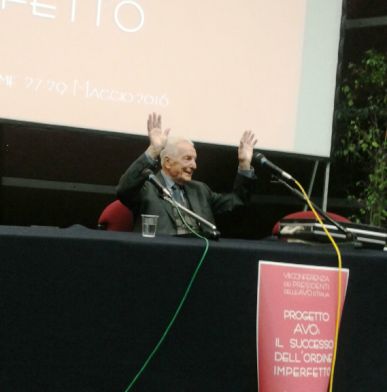
5 Dec 2016 | Focolare Worldwide, Senza categoria
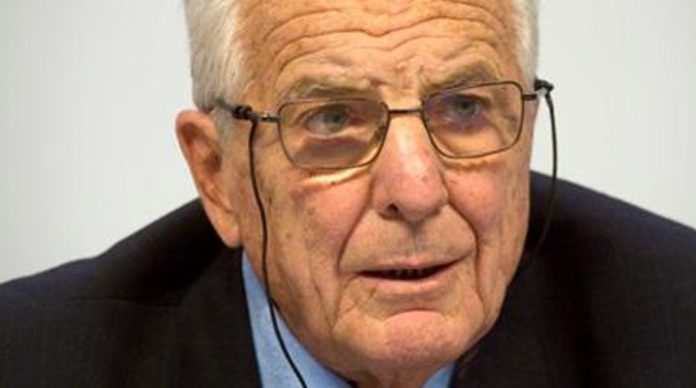 Erminio Longhini was born in Milan, Italy, on July 19, 1928. After his marriage with Nuccia, he and his wife had three children: Michela, Matteo and Stefano. While they were still university students, Nuccia and Erminio were determined to keep the human person at the centre of their professional life. “Ever since I was a child,” Erminio himself admits, “I felt strongly drawn to the Virgin Mary.” Perhaps this explains his filial devotion to “so beautiful a Mother” that even though he was buried in professional responsibilities, he offered to accompany the sick on their journeys to Lourdes. He was serious, scrupulous, demanding and went through years of hard sacrifice working from morning until deep into the night serving the sick and doing research. But his soul was also searching. He and Nuccia felt the need for a spirituality that could accompany the life of their family. They found their answer in the Focolare, in God-Love to whom Erminio felt called to give himself completely, and to serve all the brothers and sisters he would meet. He became a married focolarino. Thanks to generous contributions he set up an internal medicine department with modern equipment and welcomed young graduates from Italy and developing countries. He managed to engage colleagues and nurses until the medical division he directed became one of the best in both technical quality and in human relationships, with hundreds of published research projects. Erminio understood more and more that it was not enough to care for the patient, but for the human being.
Erminio Longhini was born in Milan, Italy, on July 19, 1928. After his marriage with Nuccia, he and his wife had three children: Michela, Matteo and Stefano. While they were still university students, Nuccia and Erminio were determined to keep the human person at the centre of their professional life. “Ever since I was a child,” Erminio himself admits, “I felt strongly drawn to the Virgin Mary.” Perhaps this explains his filial devotion to “so beautiful a Mother” that even though he was buried in professional responsibilities, he offered to accompany the sick on their journeys to Lourdes. He was serious, scrupulous, demanding and went through years of hard sacrifice working from morning until deep into the night serving the sick and doing research. But his soul was also searching. He and Nuccia felt the need for a spirituality that could accompany the life of their family. They found their answer in the Focolare, in God-Love to whom Erminio felt called to give himself completely, and to serve all the brothers and sisters he would meet. He became a married focolarino. Thanks to generous contributions he set up an internal medicine department with modern equipment and welcomed young graduates from Italy and developing countries. He managed to engage colleagues and nurses until the medical division he directed became one of the best in both technical quality and in human relationships, with hundreds of published research projects. Erminio understood more and more that it was not enough to care for the patient, but for the human being.  In collaboration with the Catholic University he carried out research in 40 hospitals, which revealed that patients’ greatest handicap was feeling dependent on others: “Why not spend a bit of our time building a human relationship, a loving exchange between us and our patients?” With some difficulty and many complications, Erminio managed to come up with the first 30 volunteers to care for the sick beyond there purely medical needs. “What did I try to convey to them?” He explains: “What I had learned from Chiara Lubich: reciprocity.” The Hospital Volunteers Association emerged from that first group, in 1976. His work was encouraged not only by Chiara Lubich, but by Cardinals Colombo and Martini from Milan, and by John Paul II himself who, during an audience for 7,000 volunteers, said to Erminio: “I’m pleased, tell your friends to continue like this.” Following the painful death of his wife, Erminio’s meekness and abandonment to God deepened. Forced to have more frequent medical visits and transfusions, he confided: “I feel like an autumn leaf on a windy day. It might seem more desirable that the evening of life should come. Then, I realize that there’s a temptation hiding there, and in the morning I realize that another day is being given to me and that life is living the present moment, counting on God’s mercy for the past and for the hopes of the future.” In the meantime, the Hospital Volunteers Association spread all over Italy and now has 25,000 volunteers in 250 hospitals. Because of his commitment, in 2004, Erminio was awarded the Gold Medal of Merit Award for Health by the President of Italy. Until the end Erminio continued to offer spiritual encouragement to the volunteers through video messages and writings. In the final months his medical condition was not reassuring, but he was serene: “I thank God because I had much more in my life than what I would have imagined. I thank the Blessed Mother, and every night I finish my prayers saying to her: “Let it be You to come and get me, and it will be pure joy. I’ll hear You and see You!” He died on November 4th. Everybody that knew and loved him, are certain that it happened just as he had desired in payment for a life seeped in the Gospel. The current president of the association writes: “A great man has left us, a man who was able to perceive with his sensitivity, humanity and faith the invisible essence that eye cannot see, nor even the mind. But he doesn’t leave us alone, each of us will meet him in their service to others if we manage to allow all the wisdom, knowledge and depth that Erminio always conveyed and taught to bear fruit.” Anna Friso
In collaboration with the Catholic University he carried out research in 40 hospitals, which revealed that patients’ greatest handicap was feeling dependent on others: “Why not spend a bit of our time building a human relationship, a loving exchange between us and our patients?” With some difficulty and many complications, Erminio managed to come up with the first 30 volunteers to care for the sick beyond there purely medical needs. “What did I try to convey to them?” He explains: “What I had learned from Chiara Lubich: reciprocity.” The Hospital Volunteers Association emerged from that first group, in 1976. His work was encouraged not only by Chiara Lubich, but by Cardinals Colombo and Martini from Milan, and by John Paul II himself who, during an audience for 7,000 volunteers, said to Erminio: “I’m pleased, tell your friends to continue like this.” Following the painful death of his wife, Erminio’s meekness and abandonment to God deepened. Forced to have more frequent medical visits and transfusions, he confided: “I feel like an autumn leaf on a windy day. It might seem more desirable that the evening of life should come. Then, I realize that there’s a temptation hiding there, and in the morning I realize that another day is being given to me and that life is living the present moment, counting on God’s mercy for the past and for the hopes of the future.” In the meantime, the Hospital Volunteers Association spread all over Italy and now has 25,000 volunteers in 250 hospitals. Because of his commitment, in 2004, Erminio was awarded the Gold Medal of Merit Award for Health by the President of Italy. Until the end Erminio continued to offer spiritual encouragement to the volunteers through video messages and writings. In the final months his medical condition was not reassuring, but he was serene: “I thank God because I had much more in my life than what I would have imagined. I thank the Blessed Mother, and every night I finish my prayers saying to her: “Let it be You to come and get me, and it will be pure joy. I’ll hear You and see You!” He died on November 4th. Everybody that knew and loved him, are certain that it happened just as he had desired in payment for a life seeped in the Gospel. The current president of the association writes: “A great man has left us, a man who was able to perceive with his sensitivity, humanity and faith the invisible essence that eye cannot see, nor even the mind. But he doesn’t leave us alone, each of us will meet him in their service to others if we manage to allow all the wisdom, knowledge and depth that Erminio always conveyed and taught to bear fruit.” Anna Friso
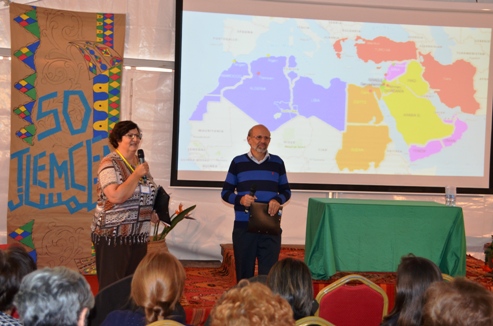
26 Nov 2016 | Focolare Worldwide
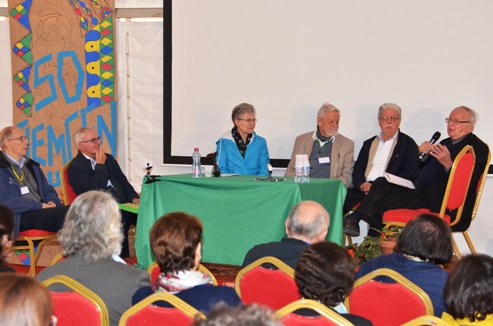 The event was attended by 90 Muslims and Christians from Jordan, Syria, Libya, Greece, Tunisia, France, Italy, Switzerland, Burkina Faso, Canada and Algeria. Four topics were discussed: suffering in light of God; the divine inspiration on unity in Chiara Lubich; the challenges and problems for the contemporary Muslim; being builders of universal brotherhood. The most repeated word at the conference was “together” which highlighted the experience that has been maturing for years in the heart of the Focolare Movement: Christians and Muslims living the ideal of unity together, according to the charism given by God to Chiara Lubich fully accepting their individual identities and differences. Chiara’s deep mystical experience from the summer of 1949 was introduced by Jésus Morán and welcomed by the participants in an atmosphere of deep fraternity: “Chiara takes us into the God of Oneness, beyond the differences of single religions,” said Jalleh who is a Sciite from Iran. Someone else remarked: “Chiara uses images that are understandable when talking about the Trinity.” Rita Moussallem and Roberto Catalano, who work for the Movement’s interreligious dialogue, presented the Focolare’s experience with different religions around the world: “You could say that God manifested himself and gave us all a bit of his light,” said one participant. After an immersion in the unity that is born from the Christian context, the focus shifted to Islam. The Algerian-Tunisian scholar Adnane Mokrani, who teaches as the Pontifical Institute of Arab and Islamist Studies at Rome (PISAI), talked about the crisis that Islam is going through today. She invited the audience not to allow itself to be taken in by the different conspiracy theories, not to blame others, but to return to the discussion table, without being discouraged: because “the majority of the people want peace, perhaps an inactive majority … But it’s up to us,” she emphasized, “an active minority to do all that we can to arouse that majority. It’s our task.”
The event was attended by 90 Muslims and Christians from Jordan, Syria, Libya, Greece, Tunisia, France, Italy, Switzerland, Burkina Faso, Canada and Algeria. Four topics were discussed: suffering in light of God; the divine inspiration on unity in Chiara Lubich; the challenges and problems for the contemporary Muslim; being builders of universal brotherhood. The most repeated word at the conference was “together” which highlighted the experience that has been maturing for years in the heart of the Focolare Movement: Christians and Muslims living the ideal of unity together, according to the charism given by God to Chiara Lubich fully accepting their individual identities and differences. Chiara’s deep mystical experience from the summer of 1949 was introduced by Jésus Morán and welcomed by the participants in an atmosphere of deep fraternity: “Chiara takes us into the God of Oneness, beyond the differences of single religions,” said Jalleh who is a Sciite from Iran. Someone else remarked: “Chiara uses images that are understandable when talking about the Trinity.” Rita Moussallem and Roberto Catalano, who work for the Movement’s interreligious dialogue, presented the Focolare’s experience with different religions around the world: “You could say that God manifested himself and gave us all a bit of his light,” said one participant. After an immersion in the unity that is born from the Christian context, the focus shifted to Islam. The Algerian-Tunisian scholar Adnane Mokrani, who teaches as the Pontifical Institute of Arab and Islamist Studies at Rome (PISAI), talked about the crisis that Islam is going through today. She invited the audience not to allow itself to be taken in by the different conspiracy theories, not to blame others, but to return to the discussion table, without being discouraged: because “the majority of the people want peace, perhaps an inactive majority … But it’s up to us,” she emphasized, “an active minority to do all that we can to arouse that majority. It’s our task.”  She and Adnane Mokrani answered several spontaneous questions from the audience. Scholar of Comparative Religions at the University of Amman, Jordan, Amer Hafi said: “God is great[er] means that he is greater than our fears, than our problems and misfortunes: God is the key of our hope and of our life. But unfortunately this invocation has become a death signal.” The presence of Emeritus Archbishop Henri Teissier with his in-depth knowledge of Islam was deeply appreciate, along with Bishop of Orano, Jean Paul Vesco. He explained: “the friendship founded on spiritual communion is the apex of dialogue among the religions and their differences.” The young Algerian Muslims from the Focolare Movement provided music and song. The visit to the mausoleum of mystic Sidi Boumediène, which was presented by Algerian scholar Dr Sari-Ali Hikmet, immersed the conference members in the spirituality, art and culture of Islam. This was followed by a visit to the El Mechouar Museum, a palace from the Zianide Dynasty, and a visit to the Great Mosque and to the modern Andalusi Centre of Studies. Before leaving Tlemcen, Jesús Morán commented on the experience: “It wasn’t only getting along, but of being one, sharing the same experience of God, of sharing what we have deepest inside of us.” Jean-Louis Marechal
She and Adnane Mokrani answered several spontaneous questions from the audience. Scholar of Comparative Religions at the University of Amman, Jordan, Amer Hafi said: “God is great[er] means that he is greater than our fears, than our problems and misfortunes: God is the key of our hope and of our life. But unfortunately this invocation has become a death signal.” The presence of Emeritus Archbishop Henri Teissier with his in-depth knowledge of Islam was deeply appreciate, along with Bishop of Orano, Jean Paul Vesco. He explained: “the friendship founded on spiritual communion is the apex of dialogue among the religions and their differences.” The young Algerian Muslims from the Focolare Movement provided music and song. The visit to the mausoleum of mystic Sidi Boumediène, which was presented by Algerian scholar Dr Sari-Ali Hikmet, immersed the conference members in the spirituality, art and culture of Islam. This was followed by a visit to the El Mechouar Museum, a palace from the Zianide Dynasty, and a visit to the Great Mosque and to the modern Andalusi Centre of Studies. Before leaving Tlemcen, Jesús Morán commented on the experience: “It wasn’t only getting along, but of being one, sharing the same experience of God, of sharing what we have deepest inside of us.” Jean-Louis Marechal
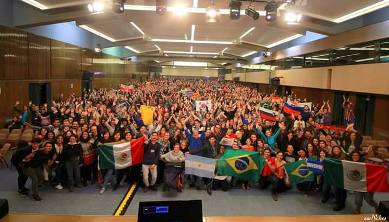
25 Nov 2016 | Focolare Worldwide
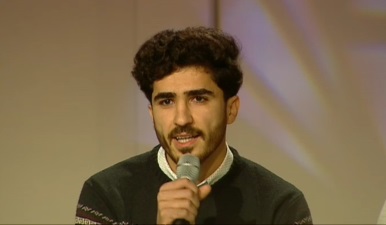 The words of the young Iraqi, Aziiz, were welcomed by a long applause and attentive gazes of more than a thousand Gen attending their annual congress. They listened closely as he recounted the drama that he and his family had lived through in Qaraqosh, a town on the Nineveh Plain, when the militiamen of the self-styled Islamic state arrived. “Before telling you my story,” Aziiz began, “I’d like to ask you a question. Have you ever thought that you could one day lose everything? Your family home with all of your most cherished memories, your friends, dreams and your people? That’s what happened to me….” The suffering of the escape from his hometown with his family towards Iraqi Kurdistan was still visible in his eyes: “I wondered why I had to go through this Calvary, and that’s where the experience began of finding myself living with Jesus Forsaken. I felt like I was in an action film, where I couldn’t differentiate between what was real and what was imaginary: masses of people walking on foot in search of a way to escape, tears, cries…. I was stiffened by the pain, but I said to myself that perhaps I could smile back at the people next to me. With us there was a group from the Yazidi religion, who were in need of even more help, because ISIS had inflicted torture on them. I put my fears aside in order to be close to them and to offer them support.” Aziiz and his family are now taking refuge in France. It was a difficult decision, given the thousands of challenges they would have to face, but he never felt abandoned by God’s love “whose invisible hand continues to wipe away our tears and lightens our sufferings.” We young people possess an enormous potential for changing the world, beginning with the small things: either we live to change something and make the world better; or our life is meaningless.”
The words of the young Iraqi, Aziiz, were welcomed by a long applause and attentive gazes of more than a thousand Gen attending their annual congress. They listened closely as he recounted the drama that he and his family had lived through in Qaraqosh, a town on the Nineveh Plain, when the militiamen of the self-styled Islamic state arrived. “Before telling you my story,” Aziiz began, “I’d like to ask you a question. Have you ever thought that you could one day lose everything? Your family home with all of your most cherished memories, your friends, dreams and your people? That’s what happened to me….” The suffering of the escape from his hometown with his family towards Iraqi Kurdistan was still visible in his eyes: “I wondered why I had to go through this Calvary, and that’s where the experience began of finding myself living with Jesus Forsaken. I felt like I was in an action film, where I couldn’t differentiate between what was real and what was imaginary: masses of people walking on foot in search of a way to escape, tears, cries…. I was stiffened by the pain, but I said to myself that perhaps I could smile back at the people next to me. With us there was a group from the Yazidi religion, who were in need of even more help, because ISIS had inflicted torture on them. I put my fears aside in order to be close to them and to offer them support.” Aziiz and his family are now taking refuge in France. It was a difficult decision, given the thousands of challenges they would have to face, but he never felt abandoned by God’s love “whose invisible hand continues to wipe away our tears and lightens our sufferings.” We young people possess an enormous potential for changing the world, beginning with the small things: either we live to change something and make the world better; or our life is meaningless.”  Chiara Lubich’s words spoken to the Gen2 in 1967 sounded timely as well as prophetic: “Rumours and news of wars sadden the world horizon. Perhaps in the Middle or Far East some of our Gen (…) were or are in danger of dying. Our very goal – to help peace in the world – seems painfully compromised. What will we do? Not be discouraged (…) The bombs fall and destroy houses and kill people: let love spread even more quickly to build a new society and a new world.” “Fifty years have passed, but we’re still that same generation that never stops, said Gloria from Uganda, “that still wants to live the ideal that Chiara has given to us.” Damián from Argentina explains: “This is a moment of celebration for us. We revisited some important moments of the Gen Movement from past years, trying to revive each word that Chiara said to us.” Testimonies were given by Gen from several countries, dialogue and reflection with music and song to celebrate the fifty years of intense life of the Focolare’s second generation. In a video message, Focolare president, Maria Voce, invited the young people to follow the plan of love that God has for each one of them, following the example of Jesus who chose the Cross – love to the very end – to be generous and willing to work for a world of peace. During an enabling and very open discussion, Focolare co-president, Jesùs Morán, encouraged the Gen to live a life of love for others, opting for the least, the people that society rejects in an ever more divided world. The more than a thousand young people departed with Chiara Lubich’s prophetic mandate: “It will be the second generation that will make the cry of Jesus Forsaken echo to the ends of the earth … And in that cry the entire world will breathe again.” Patrizia Mazzola
Chiara Lubich’s words spoken to the Gen2 in 1967 sounded timely as well as prophetic: “Rumours and news of wars sadden the world horizon. Perhaps in the Middle or Far East some of our Gen (…) were or are in danger of dying. Our very goal – to help peace in the world – seems painfully compromised. What will we do? Not be discouraged (…) The bombs fall and destroy houses and kill people: let love spread even more quickly to build a new society and a new world.” “Fifty years have passed, but we’re still that same generation that never stops, said Gloria from Uganda, “that still wants to live the ideal that Chiara has given to us.” Damián from Argentina explains: “This is a moment of celebration for us. We revisited some important moments of the Gen Movement from past years, trying to revive each word that Chiara said to us.” Testimonies were given by Gen from several countries, dialogue and reflection with music and song to celebrate the fifty years of intense life of the Focolare’s second generation. In a video message, Focolare president, Maria Voce, invited the young people to follow the plan of love that God has for each one of them, following the example of Jesus who chose the Cross – love to the very end – to be generous and willing to work for a world of peace. During an enabling and very open discussion, Focolare co-president, Jesùs Morán, encouraged the Gen to live a life of love for others, opting for the least, the people that society rejects in an ever more divided world. The more than a thousand young people departed with Chiara Lubich’s prophetic mandate: “It will be the second generation that will make the cry of Jesus Forsaken echo to the ends of the earth … And in that cry the entire world will breathe again.” Patrizia Mazzola
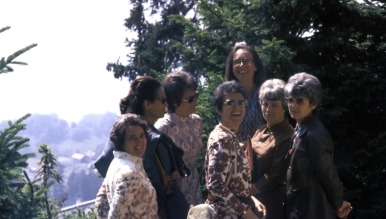
22 Nov 2016 | Focolare Worldwide
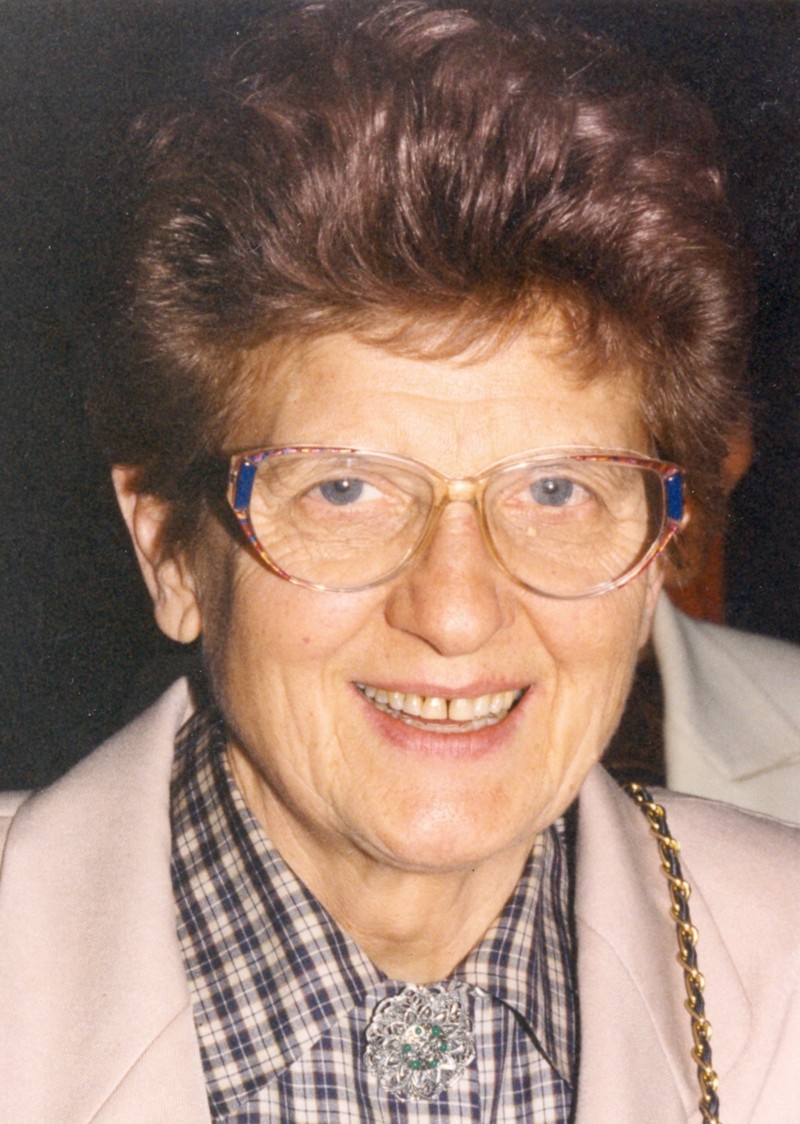 “Let us accompany Aletta with joy and immense gratitude to the house of the Father. We couldn’t have a better model of one who “gave her life unsparingly” to God, as today’s daily thought suggests.” This is how Maria Voce informed the members of the Focolare Movement of the death of Vittoria Salizzoni, who passed away peacefully on the morning of 22 November, a few days before reaching the age of 92 years. Vittoria Salizzoni was born in Martignano (Trent) on 27 November 1924. She was the third of 8 children born to Mary and David Salizzoni. She lived in France for 12 years where she had emigrated with her family. In 1941, she returned to Trento and on 7 January 1945, during World War II, she met Chiara Lubich, and remained close to her for many years.
“Let us accompany Aletta with joy and immense gratitude to the house of the Father. We couldn’t have a better model of one who “gave her life unsparingly” to God, as today’s daily thought suggests.” This is how Maria Voce informed the members of the Focolare Movement of the death of Vittoria Salizzoni, who passed away peacefully on the morning of 22 November, a few days before reaching the age of 92 years. Vittoria Salizzoni was born in Martignano (Trent) on 27 November 1924. She was the third of 8 children born to Mary and David Salizzoni. She lived in France for 12 years where she had emigrated with her family. In 1941, she returned to Trento and on 7 January 1945, during World War II, she met Chiara Lubich, and remained close to her for many years.

Aletta Salizzoni (right) with some of the first companions of Chiara Lubich

 Erminio Longhini was born in Milan, Italy, on July 19, 1928. After his marriage with Nuccia, he and his wife had three children: Michela, Matteo and Stefano. While they were still university students, Nuccia and Erminio were determined to keep the human person at the centre of their professional life. “Ever since I was a child,” Erminio himself admits, “I felt strongly drawn to the Virgin Mary.” Perhaps this explains his filial devotion to “so beautiful a Mother” that even though he was buried in professional responsibilities, he offered to accompany the sick on their journeys to Lourdes. He was serious, scrupulous, demanding and went through years of hard sacrifice working from morning until deep into the night serving the sick and doing research. But his soul was also searching. He and Nuccia felt the need for a spirituality that could accompany the life of their family. They found their answer in the Focolare, in God-Love to whom Erminio felt called to give himself completely, and to serve all the brothers and sisters he would meet. He became a married focolarino. Thanks to generous contributions he set up an internal medicine department with modern equipment and welcomed young graduates from Italy and developing countries. He managed to engage colleagues and nurses until the medical division he directed became one of the best in both technical quality and in human relationships, with hundreds of published research projects. Erminio understood more and more that it was not enough to care for the patient, but for the human being.
Erminio Longhini was born in Milan, Italy, on July 19, 1928. After his marriage with Nuccia, he and his wife had three children: Michela, Matteo and Stefano. While they were still university students, Nuccia and Erminio were determined to keep the human person at the centre of their professional life. “Ever since I was a child,” Erminio himself admits, “I felt strongly drawn to the Virgin Mary.” Perhaps this explains his filial devotion to “so beautiful a Mother” that even though he was buried in professional responsibilities, he offered to accompany the sick on their journeys to Lourdes. He was serious, scrupulous, demanding and went through years of hard sacrifice working from morning until deep into the night serving the sick and doing research. But his soul was also searching. He and Nuccia felt the need for a spirituality that could accompany the life of their family. They found their answer in the Focolare, in God-Love to whom Erminio felt called to give himself completely, and to serve all the brothers and sisters he would meet. He became a married focolarino. Thanks to generous contributions he set up an internal medicine department with modern equipment and welcomed young graduates from Italy and developing countries. He managed to engage colleagues and nurses until the medical division he directed became one of the best in both technical quality and in human relationships, with hundreds of published research projects. Erminio understood more and more that it was not enough to care for the patient, but for the human being.  In collaboration with the Catholic University he carried out research in 40 hospitals, which revealed that patients’ greatest handicap was feeling dependent on others: “Why not spend a bit of our time building a human relationship, a loving exchange between us and our patients?” With some difficulty and many complications, Erminio managed to come up with the first 30 volunteers to care for the sick beyond there purely medical needs. “What did I try to convey to them?” He explains: “What I had learned from Chiara Lubich: reciprocity.” The Hospital Volunteers Association emerged from that first group, in 1976. His work was encouraged not only by Chiara Lubich, but by Cardinals Colombo and Martini from Milan, and by John Paul II himself who, during an audience for 7,000 volunteers, said to Erminio: “I’m pleased, tell your friends to continue like this.” Following the painful death of his wife, Erminio’s meekness and abandonment to God deepened. Forced to have more frequent medical visits and transfusions, he confided: “I feel like an autumn leaf on a windy day. It might seem more desirable that the evening of life should come. Then, I realize that there’s a temptation hiding there, and in the morning I realize that another day is being given to me and that life is living the present moment, counting on God’s mercy for the past and for the hopes of the future.” In the meantime, the Hospital Volunteers Association spread all over Italy and now has 25,000 volunteers in 250 hospitals. Because of his commitment, in 2004, Erminio was awarded the Gold Medal of Merit Award for Health by the President of Italy. Until the end Erminio continued to offer spiritual encouragement to the volunteers through video messages and writings. In the final months his medical condition was not reassuring, but he was serene: “I thank God because I had much more in my life than what I would have imagined. I thank the Blessed Mother, and every night I finish my prayers saying to her: “Let it be You to come and get me, and it will be pure joy. I’ll hear You and see You!” He died on November 4th. Everybody that knew and loved him, are certain that it happened just as he had desired in payment for a life seeped in the Gospel. The current president of the association writes: “A great man has left us, a man who was able to perceive with his sensitivity, humanity and faith the invisible essence that eye cannot see, nor even the mind. But he doesn’t leave us alone, each of us will meet him in their service to others if we manage to allow all the wisdom, knowledge and depth that Erminio always conveyed and taught to bear fruit.” Anna Friso
In collaboration with the Catholic University he carried out research in 40 hospitals, which revealed that patients’ greatest handicap was feeling dependent on others: “Why not spend a bit of our time building a human relationship, a loving exchange between us and our patients?” With some difficulty and many complications, Erminio managed to come up with the first 30 volunteers to care for the sick beyond there purely medical needs. “What did I try to convey to them?” He explains: “What I had learned from Chiara Lubich: reciprocity.” The Hospital Volunteers Association emerged from that first group, in 1976. His work was encouraged not only by Chiara Lubich, but by Cardinals Colombo and Martini from Milan, and by John Paul II himself who, during an audience for 7,000 volunteers, said to Erminio: “I’m pleased, tell your friends to continue like this.” Following the painful death of his wife, Erminio’s meekness and abandonment to God deepened. Forced to have more frequent medical visits and transfusions, he confided: “I feel like an autumn leaf on a windy day. It might seem more desirable that the evening of life should come. Then, I realize that there’s a temptation hiding there, and in the morning I realize that another day is being given to me and that life is living the present moment, counting on God’s mercy for the past and for the hopes of the future.” In the meantime, the Hospital Volunteers Association spread all over Italy and now has 25,000 volunteers in 250 hospitals. Because of his commitment, in 2004, Erminio was awarded the Gold Medal of Merit Award for Health by the President of Italy. Until the end Erminio continued to offer spiritual encouragement to the volunteers through video messages and writings. In the final months his medical condition was not reassuring, but he was serene: “I thank God because I had much more in my life than what I would have imagined. I thank the Blessed Mother, and every night I finish my prayers saying to her: “Let it be You to come and get me, and it will be pure joy. I’ll hear You and see You!” He died on November 4th. Everybody that knew and loved him, are certain that it happened just as he had desired in payment for a life seeped in the Gospel. The current president of the association writes: “A great man has left us, a man who was able to perceive with his sensitivity, humanity and faith the invisible essence that eye cannot see, nor even the mind. But he doesn’t leave us alone, each of us will meet him in their service to others if we manage to allow all the wisdom, knowledge and depth that Erminio always conveyed and taught to bear fruit.” Anna Friso





 “Let us accompany Aletta with joy and immense gratitude to the house of the Father. We couldn’t have a better model of one who “gave her life unsparingly” to God, as today’s daily thought suggests.” This is how
“Let us accompany Aletta with joy and immense gratitude to the house of the Father. We couldn’t have a better model of one who “gave her life unsparingly” to God, as today’s daily thought suggests.” This is how